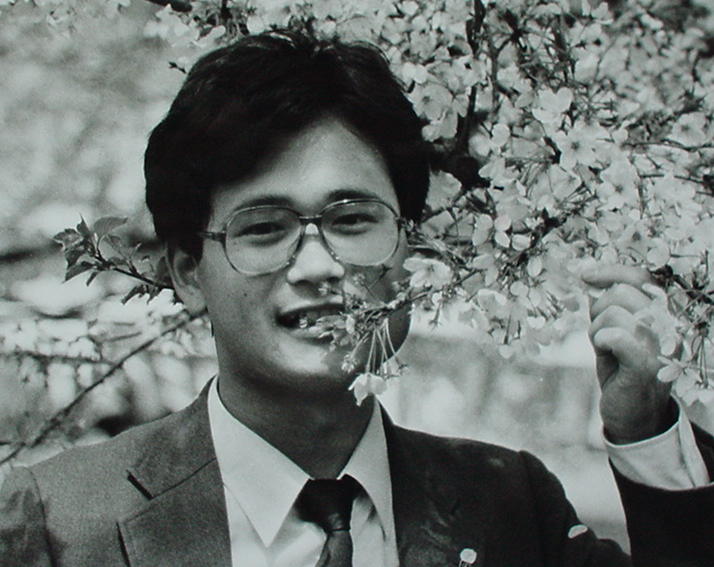 ��1988/4/14���t��Áu���������(�V�h�䉑)�ɂāB���@�S���ł����B
��1988/4/14���t��Áu���������(�V�h�䉑)�ɂāB���@�S���ł����B�W���p���^�C���Y���L�Ҏ���ɏ������p���L���ł��B�O���ȒS�����������̋L�������S�B
 ��1988/4/14���t��Áu���������(�V�h�䉑)�ɂāB���@�S���ł����B
��1988/4/14���t��Áu���������(�V�h�䉑)�ɂāB���@�S���ł����B
�@
�ɓ��T���̓y���l�[���ł��B�T���̓~�V�K���B�̍��Z�ɗ��w���Ă����Ƃ��ɕt�����j�b�N�l�[���ł��B�v���t�B�[��
�@
���̃T�C�g���z�[���ɍs��
���̃y�[�W�̖ڎ��F
�g�b�v�@���t�̕��@�R�X�^���J�@�C���N�l�������i1985�j�@���r�C�X�g�@�S���o�`���t�@�����փe���@��}�A�������@��A�t���J
�T�~�b�g�@���[�K���@�����S���@�ɓ����`�u�{�̕\���v�@�V�l���C�@���`�Ԋ��@Globalization
�Ō�ɕҏW���������@
The Japan
Times�ɓ��T�����������L���@�p���V���@�p���L�ҁ@�p��V���@�p��ŏ����A�p��ŕ@�p��̐��E�@�p��̐��E�@�p��̐��E�@�p��̐��E�@�p��̐��E�@�p��̐��E�@�p��̐��E�@�p��̐��E�@�p��̐��E�@�p��̐��E�@�p��̐��E�@�p��̐��E�@�p��̐��E�@�p��̐��E�@�p��̐��E�@�p��̐��E�@�p��̐��E�@�p��̐��E�@�p��̐��E�@�p��̐��E�@�p��̐��E�@�p��̐��E�@�p��̐��E�@�@�p��̐��E
������O���̋��ȏ�
�삯�o������̋L���ł��B�O���̋��ȏ������{���ǂ��`���Ă��邩�ɂ��āB����������ł����A�ƂĂ��s�����̂��B
�Ȃ��A�L���͋���OCR�œǂݍ����̂Ȃ̂ŁA�E��������悤�ł�
1983/8/25
-- At Collection of Japan Assembled at Maruzen –
Crowds Enjoy Reading Textbooks
School
textbooks are fun to read - at least to the crowds of visitors jamming an
exhibition of foreign school books containing descriptions of Japan at Maruzen
in Tokyo's Nihonbashi.
The bookstore is displaying more than 100 history, geography and social studies textbooks on its third floor during Aug. 22-27.
The books are part of the 20,000-book collection assembled by the International Education Information Center, a subsidiary of the Foreign Ministry.
Since its inception in 1957, the center has been instrumental in correcting errors, exaggerations and misleading writing about Japan in foreign textbooks and encyclopedias in 81 nations by writing to their publishers and authors.
Some of the exhibited books contain errors. For example, a Japanese family wears 'zori' slippers In their house on New Year's Day in a cartoon in a Canadian book first published in 1974.
In a 1968 Lebanese book, Urashlma Taro, the folktale character, rides on a crocodile, instead of a turtle, as he goes down to the undersea palace of Princess Otohime, who is already married!
A 1977 Soviet book carries a photograph of a Shibuya street on a "pedestrians' paradise day" and explains "Cars are banned from this street in Tokyo in order to prevent air pollution." Maybe this is true.
Several other books at the exhibition have - outdated or stereotyped pictures" and descriptions, Including those on geisha (who are often confused with �goiran" prostitutes), harakiri (properly called seppuku), and rickshaw.
Many other textbooks, however, have abandoned the old-fashioned image of Japan and instead concentrate on modern Japan, although their descriptions are sometimes exaggerated.
Japan is an over-aggressive economic power where people are pushed into trains (or left out of them) by railroad staff during rush hours, in a 1972 American book.
Every Japanese child is plagued by air pollution in a 1977 Soviet textbook.
Some other books show remarkably bright observation on the Japanese:
A 1975 British book says, "The Japanese are such expert at dubbing (European and American films) that many Japanese children are under the impression that the whole world speaks Japanese!"
A 1971 American book: "In their leisure time, people here either do nothing - that is, take a nap -- or watch television, or do other things inside the house. There are fewer places to go, because of the population density. In the U.S., people go to the beach or the movies."
Caption: "The employer - the father figure. Arranging marriages, housing, holiday , medical services and pension of the employees are all entrusted to his hands. A Japanese usually devotes his entire life to one firm, because he knows that time, rather than ability, brings him promotions," says a 1975 British textbook.
�g�b�v�@���t�̕��@�R�X�^���J�@�l���@���r�C�X�g�@�S���o�`���t�@�T�~�b�g�@���[�K���@�����S���@�V�l���C�@���`�Ԋ��@Globalization �@
���t�̕ǂ��琶������Ė��C�B�����������̌�����T��ST�u����ł��Ȃ����p���L�ҁv�ۑ�Ȃǂ����܂�Ă��܂��B
�p��́u�������Ƃ��ǂ�ǂ�������v���ہi���{��ł͈�̌��܂蕶������x�ł��g���j�͂��낢��Ȍ���������N�����܂��B������w�p���L���̓ǂݕ��x��V�͂Ő������܂����B
�u���̌�������v��impossible�Ɛ����������̋L�������ƂŁA�đ�\�c�����{�B���Ė؍ފŌ��͌��܂����B������w�l�C�e�B�u�ɒʂ���p��̏������x��V�͂Ő������܂����B
���������������������̂����̋L���ł��B
��Language barrier slowing down
Japan-U.S. trade negotiations
The Japan Times 1985/3/15/p3
Language barriers are hard to crack even when excellent interpreters are available. The Japan-U.S. trade talks under way in Tokyo prove this point.
One of the four subdivisions of the talks, which aims to increase American access to Japan's telecommunications market, was cut short Wednesday after only two hours of discussion, following the conviction by some Japanese officials that the Americans had suddenly changed their demands on crucial issues, which were first put forth during the last meeting on March 5.
What appeared to be new American demands were actually mere rephrasing of the old ones, to which Japanese negotiators headed by Vice Minister for Posts and Telecommunications Moriya Koyama were ready to give a few nods, according to a senior Foreign Ministry official.
Changing expressions every time the same subject comes up in writing or speech, such as saying "pictures" instead of "photographs," is an important technique in the English-language world, which makes the writer or speaker look like an intelligent person with a rich vocabulary.
Rephrasing, however, is not common in the Japanese language. Few thesauri have been published in Japan to prove the point.
"The American side used different expressions (for the same thing at the Wednesday meeting). Then the Japanese officials became cautious (against saying 'yes' for an answer)," a senior Foreign Ministry official who attended the meeting said.
"I told (Koyama and other bewildered Japanese officials) that I think what the Americans were saying were only rephrasing of what they said earlier." the official: who understands English perfectly as a diplomat, said.
"But they wouldn't agree. So l figured this meeting would be meaningless and suggested that we postpone it.
"If the Americans had made their statements with the same expressions as in the last meeting, we could have said 'yes' (to certain demands).
"In fact, every time the Americans come to a meeting, they say the same things differently. Even among themselves, they use a mélange of different expressions for the same thing'," he added.
The rephrasing of the American requests, some of them asking Japan to decontrol advanced value-added-network services, bewildered Koyama and postponed the Wednesday meeting for one day. The deadline on the Nakasone government's pledge to liberalize Japan's telecommunications market is April 1, when the giant Nippon Telegraph and Telephone Public Corporation (NTT) is denationalized.
If the Japanese and American negotiators keep postponing the telecommunications talks, as they have done, the deadline may end up being just another April Fool's Day.
Besides rephrasing, ambiguous Japanese words are another example of language barriers that tend to complicate Japan's international negotiations involving itself.
When a Japanese politician says something is "muzukashii" or "konnan" (difficult) in answer to requests, Japanese take it almost intuitively as a sign of polite refusal.
English-speaking people, however, may be led to think the statesman may challenge the task, which is not easy but not unattainable.
Because of this, less misunderstanding will result from international meetings if interpreters are allowed to translate "muzukashii" into "impossible."
Since interpreters are required to produce word-for-word translations during political talks, for intended accuracy, confusions develop between nations.
The Japan-U.S. trade talks in the field of forest products trade are a case in point.
The negotiations on this particular issue should have taken place several times by now. But the meeting was held only once, on Feb. 25, and even an agreement on the next conference date is nowhere in sight.
The Feb. 25 meeting ended in a "sort of a rupture,�h in the words of one key Japanese official, after the U.S. negotiators discovered that the Japanese would not lower tariffs.
Japan had promised to discuss trade liberalization on lumber, the U.S. side argued at the meeting.
The Japanese officials argued back. They said Japan had agreed to discuss the matter, but that Prime Minister Yasuhiro Nakasone told President Ronald Reagan in a Los Angeles meeting Jan. 2 that reducing lumber tariffs is "difficult." (All the recent trade talks derive from the New Year summit.)
Learning that the Japanese officials were willing to "discuss" the issue but reluctant to reduce the tariffs, the American negotiators, who had flown all the way from across the Pacific, were offended .
Pressed for an explanation by the Americans later, a Japanese official said. "Difficult means impossible. But we don't use the word impossible because if we do, that will be the end of diplomacy."
The Americans have not flown back since.
�@
�����R�X�^���J�哝�̂��C���^�r���[
�g�b�v�@���t�̕��@�R�X�^���J�@�l���@���r�C�X�g�@�S���o�`���t�@�T�~�b�g�@���[�K���@�����S���@�V�l���C�@���`�Ԋ��@Globalization
��͕s�ێ������@�ɖ������������͓��{�����ł͂���܂���B���ẴR�X�^���J�͌R����[���A�A�����J����̊�n�v�����F�߂܂���B���Ɨ\�Z�̂S���̂P�������ɓ��ĂĂ��邻���ł��B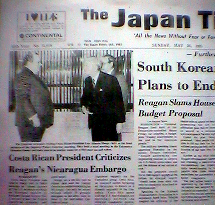
The Japan Times, May 26, 1985, Page 1
Costa Rican President Luis Alberto Monge said in Tokyo Saturday he "cannot approve of" the U.S. economic embargo on Nicaragua imposed by President Ronald Reagan May 7, because it hurts the Central American economy and violates several international agreements.
Monge, on a six-day visit to Japan, also said the Central American conflicts centering on Nicaragua can only be solved through efforts to promote dialogues in the area, such as those by the four-nation Contadora Group.
Monge called for stepped-up Japanese support for the Contadora group. Costa Rica, an unarmed nation bordering on Nicaragua, is known as a staunch supporter of the Contadora. "Costa Rica agrees with the U.S. that dialogues are necessary between the (Marxist Sandinista) government of Nicaragua and the antigovernment (guerrilla) forces . . . but we cannot approve of the economic embargo . . . because it destroys the Central American Common Market," Monge said at his Tokyo hotel in an interview with The Japan Times.
"And these sanction measures violate several international agreements. We cannot follow the (U.S.) line," he said.
President Reagan abruptly cut off $58 million in U.S. imports from Nicaragua in an attempt to pressure the Sandinista government into beginning democratic reforms, after Congress repeatedly refused to provide aid for Nicaraguan rebels. Commentators have said a total embargo would actually push the Sandinistas even closer to the Soviet Union and Cuba.
"I don't think these (embargo) measures have such an effect. Nicaragua was totally pro-Soviet even before the measures were taken,�h Monge said.
He said many difficulties and
Continued on Page 6
�@
2004�N�S���̓��{�l�C���N�l���������N�����Ƃ��A�����ւ����1985�N�̓��l�Ȏ������v���o���܂����B�l����������Q�����̗v���ɂ��A��ނȂ��������L���ł��B�T��ST�A�ځu����ł��Ȃ����p���L���v�ɂāA���̌o�܂��ۑ�ɂ��ďo�肵�܂����i04/5�j�B
���l�̐l���������N���邽�тɎv���o�������ł��B��F�u�u�C�X�������v�A���{�l�Q�l��l�����@�E�Q���x���v����2015/1
���{��G�b�Z�C�u�l�������ł̋ꂢ�o���v(NHK�T�C�g)
July 5, 1985�@ Page 3
Japan to Keep Up Iraq Talks
On Release of NEC Hostages
The
Foreign Ministry said Thursday it will continue its negotiations through the
Iraqi government in a bid to obtain the release of two Japanese radio
technicians held hostage by Kurdish rebels in northern Iraq since April 7.
A rebel
spokesman said in Athens Wednesday the Patriotic Union of Kurdistan (PUK) , one
of the two Kurdish rebel groups in Iraq, had released 22 foreigners held hostage
for months, but not the two Japanese workers of an NEC Corp.-affiliated firm
stationed in Iraq.
The PUK's
demands, although unclear, include commitments by the Japanese government and
Japanese firms not to engage in military or related projects in Iraqi
The
Japanese government and firms have not been engaged in any foreign military
projects since the end of World War II because of the nation's self-defense-only
national policies.
According
to the ministry, the two Japanese were abducted by the rebels April 7 while they
were on their way by car to carry out maintenance work on some radio equipment
in northern Iraq.
The
ministry has confirmed, from various sources, that the two men are safe,
healthy, and have been treated as "guests" in Kurdish villages.
A few Japanese workmen were almost
kidnapped in 1982 in the area. Later in the year, one NEC worker was abducted
but was released a week later before the Japanese government had taken any
action, ministry officials said.
In all
previous abductions carried out by PUK, none of the hostages have been killed or
harmed, according to the ministry.
The Kurds
are a mountain people who themselves claim to be the descendents of the ancient
Medes. Their homeland is now divided between
The
Kurdish-Iraqi war of 1970 led to an agreement to allow the Kurds limited
autonomy, but this was not fully implemented and warfare broke out again in 1974
.
......�֘A�L���������B
���������{�l�l�����ɉ��
September 13, 1985 �@Page 3
2 Japanese Released by Kurdish Rebels
Two
Japanese radio technicians held hostage by Kurdish rebels in northern Iraq since
April were released Wednesday and will return to Tokyo in a few days, the
Foreign Ministry and their employers said Thursday.
Reports to
the ministry from its Iraqi embassy in
The two
firms belong to a group of firms led by NEC Corp.
The two
men were abducted by the Patriotic Union of Kurdistan (PUK), a KDPI-related
group, on April 7 while, they were on their way by car to carry out maintenance
work on radio communications facilities in northern
The
ministry had confirmed from various sources that the two were unharmed, healthy,
and had been treated as "guests" in Kurdish villages.
PUK has
also abducted several foreign residents in the area in the past to publicize its
independence movement. In all the previous abductions carried out by PUK, none
of the hostages have been killed or harmed, according to the ministry.
PUK's
demands for the release, although unclear, included commitments by the Japanese
government and firms not to engage in military-related projects in Iraqi
Kurdistan, and to press
Ministry
officials said Thursday Japan has informed the rebels that
Another
demand by PUK was to have a major English-language newspaper in
The
Foreign Ministry and NEC requested The Japan Times on July 4 to carry such an
article and to keep the demand a secret.
The
Japan Times basically agreed to the requests, to secure the safety of the two
hostages. It printed a relatively large article on the hostage incident in its
July 5 issue, without any photo. Part of the article, a rebel announcement
in
Several
organizations, such as the International Red Cross, have made mediation efforts
for release of the Japanese and other hostages.
The two
Japanese technicians released Wednesday were later questioned by Iraqi
authorities. They are now in
Both the
Foreign Ministry and NEC announced Thursday they are extremely glad over the
news of the release. The ministry added that the abduction was an "extremely
inhuman" act and hopes such an incident will not be repeated in the future.
In past
cases, a few Japanese workmen were almost kidnapped in 1982 in northern
���ǎ҂̐��@
�v���Ԃ�ɃT�������HP�֍s���āA�l���̋L����q�����Ă��܂����B�����m������œǂ̂ŁA�M�����̂����ݏグ�Ă��܂����B�@���E�������b�q����04/6/18�iST�u�p���L�ҁv�o�蒼��j
�����A�C���N�Ŋ؍��l�̐l���̕����E���ꂽ�Ƃ��������ɂ��܂����B���Ďc�s�Ȃ��Ƃł��傤�ˁB�Q�O�N�O�̐l�������̍ۂɂ́A�T��������l���̊ւ�����A�ӔC�̏d���L����������邱�ƂɂȂ�A���̎��̍��f�A��Y���@�����肾�������A
(ST)���T���Œm�邱�Ƃ��ł��܂����B�ł����̍b�゠���āA���̎��͐l���������������Ă悩�����ł��B�y���̗͂͋����ł��ˁB ��ʌ��E�c���a�q����@04/6/23
�������r�C�X�g�����Ė��C�ɉ�����?
�g�b�v�@���t�̕��@�R�X�^���J�@�l���@���r�C�X�g�@�S���o�`���t�@�T�~�b�g�@���[�K���@�����S���@�V�l���C�@���`�Ԋ��@Globalization
1986�N�A�O���ȉ���y���W���p���^�C���Y�Ȃɂ�
The Japan Times 86/2/24p1
���{���{���Ƃ��č��Ōق��Ă��郍�r�C�X�g���ɂ��Ă̒����B���{��Ƃ������J���ł��B������������Ă�����{��ƂɁu���͓��Ђɂ��C����Ɣ��肱�ށu�}�b�`�|���v�v�����܂��B���r�C�X�g�ɔN�z�Ȃ�� $14,294,000���x���������ł��B
The Japan-U.S. "trade friction" has been a bonanza for Washington lobbyists for the last two decades, but they may face decreased profits now that the Japanese government has started to advise corporations to check carefully before hiring or paying exorbitant fees to these "hired guns. "
Talk of Japanese corporations being "easy game" for some of the less creditable consulting firms in the U.S. has been going on for some time. This was one of the biggest topics when all the top-level diplomats stationed across the U.S., including Ambassador Nobuo Matsunaga, met in late January to discuss Japan's public relations strategy toward the United States.
Foreign Ministry spokesman Yoshio Hatano, who went to Washington for the special meeting, was among those who deplored the naive nature of the Japanese corporations which have hired lobbyists to try to ensure that Congress does not block their exports.
According to officials, Hatano said that many of the corporations are just "dancing to their (lobbyists') tunes." The lobbyists - big-name lawyers, consulting firms, former politicians and government officials - collect intelligence, give advise and help influence Congress and the administration.
While they are a necessity and some of them are quite good, others try to get hired by first creating problems through such means as anonymous and excessive public accusations that Japan is engaging in unfair trade practices. They then offer help to Japanese corporations for exorbitant fees, Hatano was quoted by officials as saying at the meeting.
Japanese diplomats believe a certain American public relations firm, which in a major campaign repeated through various media that "Japan has unfair trade practices" over and over again like in a TV commercial last spring, is responsible for forcing that impression on many Americans.
The PR firm was at that time hired by an American computer company. The Washington meeting decided that the ministry and the embassy will, upon enquiry, advise Japanese firms on which consulting firms to choose and what to expect of them. So far, about 15 firms have called for advice, according to one official.
"Corporations from other countries would require their American lobbyists to report their activities in detail, and give specific instructions on what to do and who to meet. Japanese business managers, however, only say 'Nanka attara yoroshiku,' (Please handle problems when they occur) and do not check on their activities," a high ministry official said.
"And they pay from 10 to 20 times the amount the Foreign Ministry pays to its consultants," he added. According to records at the U.S. Justice Department, at least $14,294,000 was spent for lobbying activities by Japanese government agencies and firms, such as Toyota, Nissan and Sony, in 1984. The sum was the biggest among foreign nations.
Millions more are said to be spent on lobbying and related activities for which reporting is not required.
To show a good example, the ministry itself may reduce its spending on the American consultants, another high official said recently. Other officials said, however, that it will only seek a more effective use of them, without reducing the cost.
Officials claimed the Japanese Embassy in Washington does not hire any lobbyists for direct negotiations with Congress members. "The embassy hires public relations consultants, not lobbyists as such. The consultants write speeches (in English) for the diplomats, brief us on the economic situation in the U.S. collect reference materials, and serve as brains," one official said.
The embassy hires more than 10 such individual or corporate consultants and pay nearly $2 million per year, according to registration documents at the U.S. Justice Department. The exact amount cannot be determined because the expenses are buried in a secret diplomatic budget item which the ambassador can use to obtain outside help.
...
Lobbyists hired by the embassy include William Fulbright and other former Congressmen. One factor which apparently made it psychologically easier for the ministry to criticize lobbying firms is that Gray & Company, one of the best known in the field, has angered governing Liberal-Democratic Party Vice President Susumu Nikaido.
Nikaido used the firm, according to a source, to try to get an appointment to see President Ronald Reagan when he visited Washington last October. Gray was not very useful, and what's worse, he demanded that Nikaido submit a list of possible Japanese market-opening policies he could bring to please Reagan.
"Why do I have to bring (political souvenirs when I want to see Reagan," an angry Nikaido was quoted as saying by the source.
Ambassador Matsunaga scrambled to get the appointment himself, and Nikaido decided not to use Gray again.
The American firm, however, was paid $246,000 for handling his U.S. visit. The government has also been worried about increasing coverage in U.S. media of the Japan lobby and a move by some Congressmen to bar former high-level federal employees from representing foreign interests.
It hopes these developments do not turn into an issue resembling the Koreagate scandal of the late 1970s.
In a then-secret contract, Dewy was paid $100,000 per year to calm down Congress after it threatened to impose surcharges on imported cotton-made clothing from Japan -- Japan's largest export item at the time.
Japan lost in this early phase of the bilateral trade war and made a humiliating concession, "voluntarily" limiting exports of cotton products to the U.S. in 1961.
Despite the failure, JETRO, or rather the MITI, still uses many lobbyists today, including Frank Church, former chairman of the Senate Foreign Relations Committee. One of the biggest lobbyist organizations for Japan was the U.S.-Japan Trade Council, an organ of the Foreign Ministry inaugurated in Washington in 1956.
It spent more than $500,000 per annum for direct and indirect lobbying. The Justice Ministry filed a complaint in 1976, charging that this organization's misleading name has covered up the nature of its activities. The council admitted later in the year that it is an agent for Japan, and has changed its name to the Japan Economic Institute.
Much of the lobbying activities have been shrouded in secrecy. Breaking with this tradition, a Japanese firm publicized its contract with William Colby in 1978.
It turned out that the firm was trying to attract customers who would pay it to hear the former Central Intelligence Agency chief's opinions of the various American lobbyists. He can tell customers if the lobbyists they are hiring are good, and if the fees are not too high, the firm advertized.
�@
�����\�A�ɃS���o�`���t�o��A���\�W���i�W��
�g�b�v�@���t�̕��@�R�X�^���J�@�l���@���r�C�X�g�@�S���o�`���t�@�T�~�b�g�@���[�K���@�����S���@�V�l���C�@���`�Ԋ��@Globalization
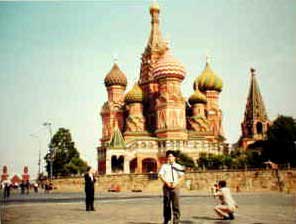 1986.6�N���������e�̎��@�ɂāB
1986.6�N���������e�̎��@�ɂāB
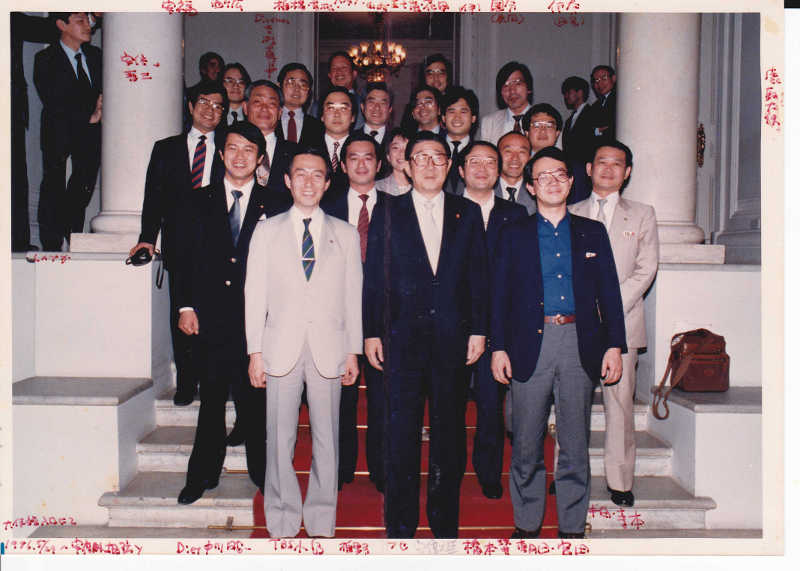
���悭����ƁA�̂��̈��{�W�O�����ʂ��Ă���M�d�Ȉꖇ�B���{�W���Y�O���i�����j�Ɠ��s�L�Ғc���A�K�\������Ƀ��X�N����g�قɂċL�O�B�e�B���q�ł�����{�W�O�E�O���鏑���̊炪�����Ɏʂ��Ă���(�����̒��̂����E�A��ԉ��̊�B���̉A�Ȃ̂ňÂ�)
�@
�\�A�͒��N�A����Ă��܂����B����ŕa��ȓƍَw���҂̎��オ�����܂����B�����ɓo�ꂵ���Ⴍ�ăG�l���M�b�V���Ȑ����^���[�_�[�B���E�ɂƂ��ďՌ��ł����B���ہA�S���o�`���t���͔����I�����������I�������A���E����j�푈�̋��|�����̂����̂ł��B�ł��A�����]���ă\�A���g������Ă��܂����̂��ނł��B
���N�\
�鐭���V�A���R���I�����i����]�˖��{�j���v��
���[�j��1917-22�@
�v���Ő��E���̎Љ��`��������
�X�^�[����1922-53:�@�ꍑ�Љ��`/��l��/�ƍ�/�ƃ\�폟���̉p�Y/���/�Ȍ�u�X�^�[�����̐��v�ƌĂ��ƍّ̐����\�A����܂ő���
�t���V�`���t�@52-64
�X�^�[�����ᔻ�A�̂����r
�u���W�l�t 1964-82
�\�A���
�A���h���|�t82-84�@���v�}�邪�a��
�`�F���l���R84-85
Gorbachev 85/3-91
�@�y���X�g���C�J�@���I�����j�푈���|���̂�
91/12
�\�A���V�A�iBoris Yeltsin�j���p���@�@Dec.
8, 1991 - Russia, Belorussia and Ukraine create the Commonwealth of Independent
States and declare the Soviet Union no longer exists; Gorbachev announces his
resignation Dec. 25.
���V�A�iBoris Yeltsin�j���p��
2000/1
�v�[�`���哝�́@Vladimir
Putin
�S���o�`���t�o���̕ω����݂Ĉ��{�W���Y�O���͖K�\������B�W���p���^�C���Y�͋L�҂s�����܂����B�S���o�`���t�����L��V�F�o���[�i�b�[�O���i��ɃO���W�A�哝�́j�Ƃ̉�k�Ȃǂ��J�o�[���܂����B
���X�N���͒ʐM��������A�L������{�փp�\�R���ő��M����̂͑�ςł����B����������Ă����悤�ł��B�p�\�R�����M��t�@�b�N�X�́u�s�[�`�`�v�Ƃ��������d�b������ė����ƁA�I�y���[�^�[���������Ă��܂��̂ɂ�����܂����B�Ȃ�Ƃ����M����������̋L���ł��B
����Gorbachev will consider request
for grave visits
Territorial talks still at
impasse
The Japan Times, June 1, 1986
MOSCOW
- The Soviet Union has promised to give positive consideration to a Japanese
request that former residents of the Soviet-held northern islands be allowed to
visit their family graves there without Soviet visas.
A joint communiqué issued Saturday at the conclusion of the Japan-Soviet foreign ministerial consultations said that the Soviet Union was ready to "positively" deal with the problem.
The communiqué touched in a very vague way on the longtime Japanese demand for reversion of the northern islands off Hokkaido.
The two countries will take up the territorial issue during the next ministerial talks in Tokyo.
Thus the statement confirmed what Abe and Shevardnadze agreed during their talks in Tokyo in January.
The communiqué did not give any details of Soviet leader Mikhail Gorbachev's promise to give positive consideration to ...�ȉ������̂ŗ�
���������ւɃ��P�b�g�e�A�v���X���u�ˌ�!�v
�č����̊O����b�\�h����ނ��邽�߁A�L�҂�e���r�N���[���O���ȂS�K�ɏW�����Ă��܂����B�����Ɂu�ߌ��h���O���ȑO�Ń��P�b�g�e���ˁv�̑���э��݂܂��B����������ނǂ���ł͂���܂���! �e�Ђ͂������܃e������֑���܂��B�č������O���Ȍ��ւɓ��������Ƃ��A���肵���v���X�������߂����ăh�h�h�Ɠːi���Ă��܂����B
1986/10/15
Bombs or the Press:
�eAttacks�f Startle Envoy
Perhaps one of the most startled people regarding a bombing attempt at the Foreign Ministry and other buildings Tuesday evening was Edward Rowny, U.S. President Ronald Reagan's envoy who had just arrived from Iceland to brief Japan about the superpower summit.
Several projectiles were fired from a sedan parked in Kasumigaseki only minutes before Rowny arrived at the ministry's front gate.
At the news, about 30 press photographers and TV crewmen who had assembled in a ministry room to cover Rowny's session with Foreign Minister Tadashi Kuranari rushed out of the building.
The throng ran at top speed toward Rowny and his aides, who were about to walk into the ministry's front entrance, and swerved to the right to head for the scene without realizing they had passed the American guests.
The press, most of them unable to spot the projectile, quickly ran back and were in time for the Rowny-Kuranari session. One projectile had landed on a street outside the ministry.
�����N���[�g�����A��}�A�������Ɍ������@(JT Weekly)�@JTW 99/4/29
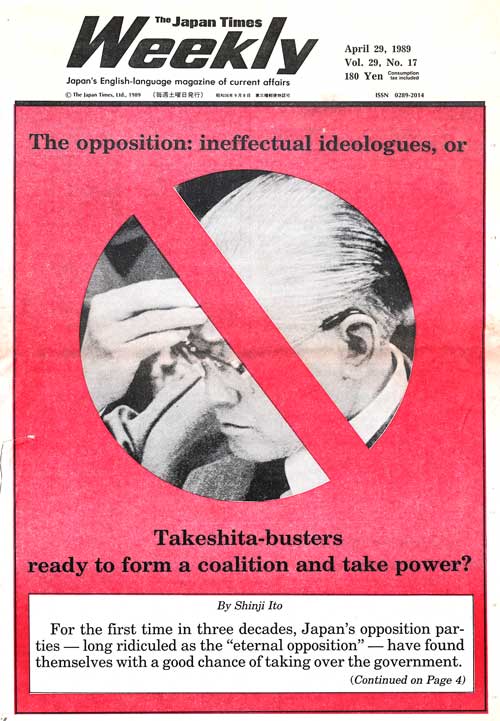 �@
�@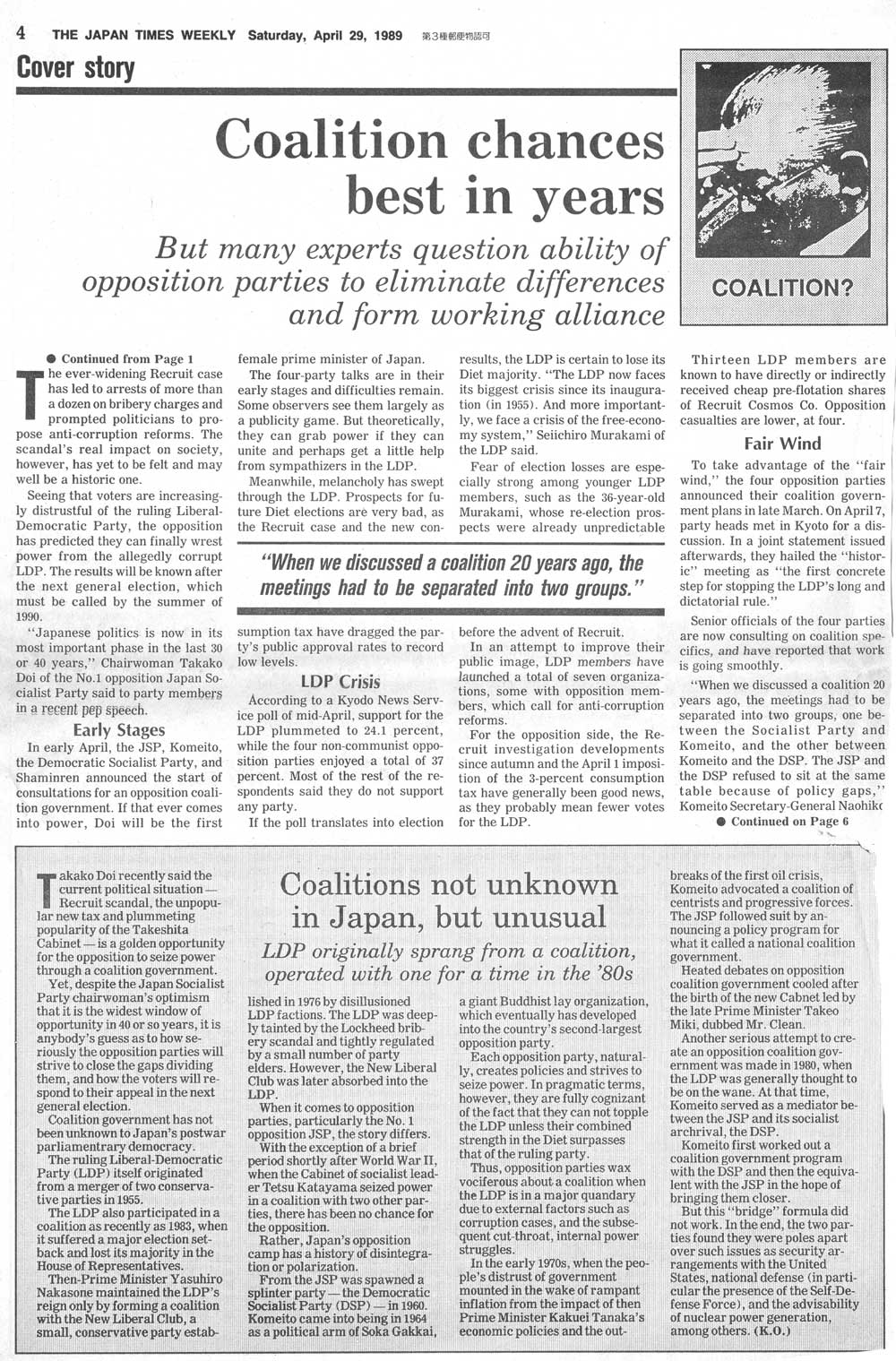 �@
�@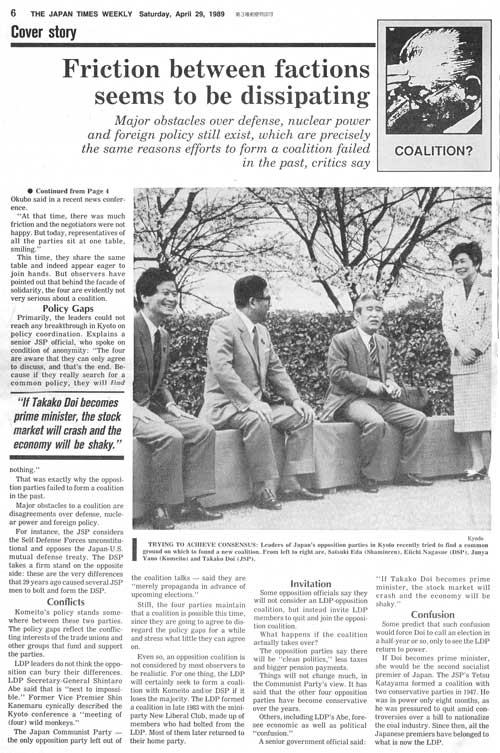
Coalition chances best in years
But many experts question ability of
opposition parties to
eliminate differences
and form working alliance
For the first time in three decades, Japan's opposition parties -- long ridiculed as the "eternal opposition" -- have found themselves with a good chance of taking over the government.
The ever-widening Recruit case has led to arrests of more than a dozen on
bribery charges and prompted politicians to propose anti-corruption reforms. The
scandal's real impact on society, however, has yet to be felt and may well be a
historic one.
Seeing that voters are increasingly distrustful of the ruling
Liberal Democratic Party, the opposition has predicted they can finally wrest
power from the allegedly corrupt LDP. The results will be known after the next
general election, which must be called by the summer of 1990.
"Japanese
politics is now in its most important phase in the last 30 or 40 years,"
Chairwoman Takako Doi of the No.1 opposition Japan Socialist Party said to party
members in a recent pep speech.
Early Stages
In early April, the
JSP, Komeito, the Democratic Socialist Party, and Shaminren announced the start
of consultations for an opposition coalition government. If that ever comes into
power, Doi will be the first female prime minister of Japan.
The four-party
talks are in their early stages and difficulties remain. Some observers see them
largely as a publicity game. But theoretically, they can grab power if they can
unite and perhaps get a little help from sympathizers in the LDP.
Meanwhile,
melancholy has swept through the LDP. Prospects for future Diet elections are
very bad, as the Recruit case and the new consumption tax have dragged the
party's public approval rates to record low levels.
LDP Crisis
According to a Kyodo News Service poll of mid-April, support for the LDP
plummeted to 24.1 percent, while the four non-communist opposition parties
enjoyed a total of 37 percent. Most of the rest of the respondents said they do
not support any party.
If the poll translates into election results, the LDP
is certain to lose its Diet majority. "The LDP now faces its biggest crisis
since its inauguration (in 1955). And more importantly, we face a crisis _of the
free-economy system," Seiichiro Murakami of the LDP said.
Fear of election
losses are especially strong among younger LDP members, such as the 36-year-old
Murakami, whose re-election prospects were already unpredictable before the
advent of Recruit.
In an attempt to improve their public image, LDP members
have launched a total of seven organizations, some with opposition members,
which call for anti-corruption reforms.
For the opposition side, the Recruit
investigation developments since autumn and the April 1 imposition of the
3-percent consumption tax have generally been good news, as they probably mean
fewer votes for the LDP.
Thirteen LDP members are known to have directly or
indirectly received cheap pre-flotation shares of Recruit Cosmos Co. Opposition
casualties are lower, at four.
Fair Wind
To take advantage of
the "fair wind," the four opposition parties announced their coalition
government plans in late March. On April 7, party heads met in Kyoto for a
discussion. In a joint statement issued afterwards, they hailed the "historic"
meeting as "the first concrete step for stopping the LDP's long and dictatorial
rule. "
Senior officials of the four parties are now consulting on coalition
specifics, and have reported that work is going smoothly.
"When we discussed a coalition 20 years ago, the meetings had to be separated
into two groups, one between the Socialist Party and Komeito, and the
other between Komeito and the DSP. The JSP and the DSP refused to sit at the
same table because of policy gaps," Komeito Secretary-General Naohiko
Continued on Page 6
Friction between factions seems to be dissipating
Major obstacles over defense, nuclear power
and foreign
policy still exist, which are precisely
the same reasons
efforts to form a coalition failed
in the past,
critics say
�@
Continued from Page 4
Okubo said in a recent news conference. "At that
time, there was much friction and the negotiators were not happy. But today,
representatives of all the parties sit at one table, smiling. "
This time,
they share the same table and indeed appear eager to join hands. But observers
have pointed out that behind the facade of solidarity, the four are evidently
not very serious about a coalition.
Policy Gaps
Primarily, the
leaders could not reach any breakthrough in Kyoto on policy coordination.
Explains a senior JSP official, who spoke on condition of anonymity: "The four
are aware that they can only agree to discuss, and that's the end. Because if
they really search for a common policy, they will find nothing. "
That was
exactly why the opposition parties failed to form a coalition in the past.
Major obstacles to a coalition are disagreements over defense, nuclear power and
foreign policy.
For instance, the JSP considers the Self-Defense Forces
unconstitutional and opposes the Japan-U.S. mutual defense treaty. The DSP takes
a firm stand on the opposite side: these are the very differences that 29 years
ago caused several JSP men to bolt and form the DSP.
Conflicts
Komeito's policy stands somewhere between these two parties. The policy gaps
reflect the conflicting interests of the trade unions and other groups that fund
and support the parties. LDP leaders do not think the opposition can bury their
differences. LDP Secretary-General Shintaro Abe said that is "next to
impossible." Former Vice Premier Shin Kanemaru cynically described the Kyoto
conference a "meeting of (four) wild monkeys."
The Japan Communist Party --
the only opposition party left out of the coalition talks -- said they are
"merely propaganda in advance of upcoming elections. "
Still, the four
parties maintain that a coalition is possible this time, since they are going to
agree to disregard the policy gaps for a while and stress what little they can
agree on.
Even so, an opposition coalition is not considered by most
observers to be realistic. For one thing, the LDP will certainly seek to form a
coalition with Komeito and/or DSP if it loses the majority. The LDP formed a
coalition in late 1983 with the miniparty New Liberal Club, made up of members
who had bolted from the LDP. Most of them later returned to their home party.
Invitation
Some opposition officials say they will not consider an
LDP-opposition coalition, but instead invite LDP members to quit and join the
opposition coalition.
What happens if the coalition actually takes over?
The opposition parties say there will be "clean politics," less taxes and bigger
pension payments.
Things will not change much, in the Communist Party's
view. It has said that the other four opposition parties have become
conservative over the years. Others, including LDP's Abe, foresee economic as
well as political "confusion."
A senior government official said: "If
Takako Doi becomes prime minister, the stock market will crash and the economy
will be shaky."
Confusion
Some predict that such
confusion would force Doi to call an election in a half-year or so, only to see
the LDP return to power.
If Doi becomes prime minister, she would be the
second socialist premier of Japan.
The JSP's Tetsu Katayama formed a
coalition with two conservative parties in 1947. He was in power only eight
months, as he was pressured to quit amid controversies over a bill to
nationalize the coal industry. Since then, all the Japanese premiers have
belonged to what is now the LDP.
�����X�N�[�v: ���{�A��A�t���J�����]����
��A�t���J�ł��A�p���g�w�C�g(�l��u��)���オ���������܂����B���l�x�z�Ɠ���ANC(�A�t���J������c)�͔��l���{�ɂ���Ĕ@������A�}���f�����c���͓�������Ă��܂����B������A�t���J��g�ق���uANC�͋Ɉ��̃e���c�́B��Ɏx�����Ȃ��łق����v�Ɖ��x�����܂�܂����B
���{�͏�������ANC���x������悤�ɂȂ�A���������ς���Ă��܂����B
1987�N4���A�����̒��]���������̋c���ƒ��ډ�B���{�ɂ��ANC�F�m�ł��B
Feb. 2, 1990 - South African President F.W. de Klerk
ends the ban on the African National Congress and nine days later Nelson
Mandela, the world's most celebrated political prisoner, is released from jail
after 27 years.
1991
�A�p���g�w�C�g�P�p
94. 4 multiracial election�@���̑S�l��Q���I���@���}���f���哝�́@�l��a����i�߂�@�����B�l�̍Ō�̃A�t���J�x�z�I���
1987/4/3? Nakasone to meet ANC Tambo
Prime Minister Yasuhiro Nakasone will meet African National Congress Chairman Oliver Tambo during Tambo's visit to Tokyo from April 19 to 24, a senior Foreign Ministry official said Thursday.
Tambo will also meet with Foreign Minister Tadashi Kuranari on April 20 and will deliver a speech to the Japanese public later in the day.
The ANC, South Africa's oldest anti-apartheid group, has been banned by Pretoria since 1960. Its headquarters are in Lusaka, Zambia.
The Foreign Ministry official said Nakasone's unofficial meeting with Tambo does not signal any fundamental change in Japan's policy toward South Africa, but that it would "certainly bring up the international status of the ANC."
Helping Nakasone's image
The meeting is also expected to help Nakasone's image. The prime minister's comment last September on the intelligence of American minorities caused a furor in the States.
The Foreign Ministry planned the Tambo visit after Kuranari decided to meet in Tokyo last September with South African Foreign Minister Roelof "Pik" Botha. The ministry was also reportedly moved by unexpectedly low support for Japan in October's election of non-permanent members to the U.N. Security Council, which reflected the view of several nations that Japan was too soft on apartheid.
Japan was elected with 107 votes, the lowest among the five elected states
���������Ŏ�v���T�~�b�g�J��
�g�b�v�@���t�̕��@�R�X�^���J�@���r�C�X�g�@�S���o�`���t�@�T�~�b�g�@���[�K���@�����S���@�V�l���C�@���`�Ԋ��@Globalization
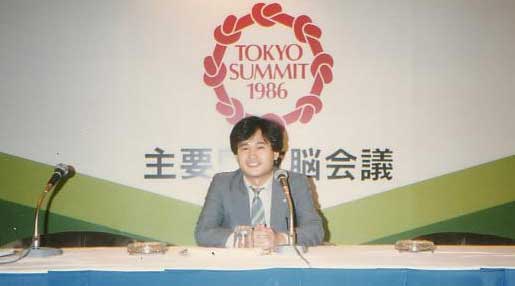
�T�~�b�g�I����A�L�҉�ȂŋL�O�B�e�B�I����ăz�b�Ƃ��Ă��܂��B
�ǂ�ȋL�������������́A�Y��Ă��܂��܂���!
1986/4/24�@���ԍ�̌}�o�قɂĎ��O��ށB�L�O�B�e�����Ă�����ANTV�̕z�{�L�҂��삯����Ă��Ĉꏏ�Ƀp�`���B�悭��ނŏ����Ă��炢�܂����B
�����z���C�g�n�E�X������]��k
�g�b�v�@���t�̕��@�R�X�^���J�@���r�C�X�g�@�S���o�`���t�@�T�~�b�g�@���[�K���@�����S���@�V�l���C�@���`�Ԋ��@Globalization
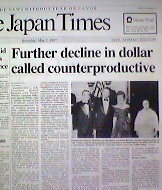 1987�N�A���]�������K�Ăɓ��s��ށB
1987�N�A���]�������K�Ăɓ��s��ށB
���V���g���؍ݒ��͂Ђ�����d���B������Madison Hotel�ɔ��܂�܂������A�H���͂قƂ�ǃJ�b�v���[�����ł��܂������܂����B
�悭�o���Ă���̂́A�A��̓��ʋ@�̋@���B�G�R�m�~�[�Ȃ̗�ɉ��ɂȂ��Ė���܂����B
�́E���[�K���哝�̂̂��������F��܂��B
The Japan Times, May 2, 2987
WASHlNGTON - U.S. President Ronald Reagan and Prime Minister Yasuhiro Nakasone agreed Friday that a further decline in the U.S. dollar would be "counterproductive" to the economic growth of both countries and to their efforts to reduce bilateral trade imbalances.
In a joint statement following two rounds of talks, the two leaders reaffirmed the need for both governments to cooperate closely to foster exchange market stability. Thus, they gave their full endorsement to the G-7 accords reached in Paris in February and in Washington in April.
Although the joint statement did not refer to the bilateral semiconductor trade dispute, Reagan said in separate press remarks that he had agreed with Nakasone to reexamine related trade data in mid-May.
He added that his government wants to withdraw the retaliatory measures it imposed last month against three Japanese export items as early as possible.
Reagan also said that he had strongly urged Nakasone to provide increased access for American agricultural products to the Japanese market.
He said that the two leaders, who held talks on Thursday and Friday, had agreed to take up the issues of agricultural trade, Third-World debtor nations and macroeconomic policy coordination at the summit meeting of seven major industrial democracies scheduled for June in Venice.
The Reagan-Nakasone joint statement also said that the reduction of the bilateral trade imbalance should be a key objective of the two countries' policy efforts.
They described the imbalance as "politically unsustainable."
"The president and prime minister agreed that outstanding trade issues between the two countries need to be resolved expeditiously," the statement said.
Reagan reiterated his determination, in the joint statement, to firmly resist protectionist pressures in the United States and to reduce the U.S. budget deficit. In return, Nakasone pledged increased Japanese efforts to stimulate domestic growth. ...�ȉ���
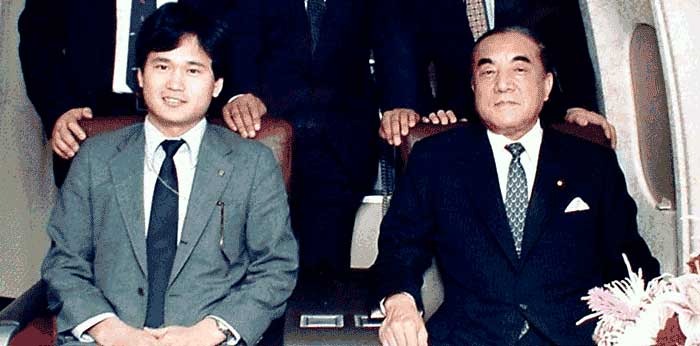 �A��̋@���ŁB
�A��̋@���ŁB
�����N���������œ��\��]��k
�g�b�v�@���t�̕��@�R�X�^���J�@���r�C�X�g�@�S���o�`���t�@�T�~�b�g�@���[�K���@�����S���@�V�l���C�@���`�Ԋ��@Globalization
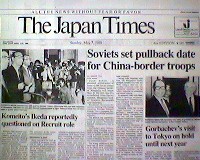 �Ăу��X�N���֏o���B�N�����������́A�ÎE������邽�߂����H���炯�̐v�ɂȂ��Ă��܂��B�������������A�S���o�`���t�哝�̎������ւ��ǂ蒅���܂����B�F�쑍���i�̐l�j�Ƃ̉�k�Ȃǂ��J�o�[�B
�Ăу��X�N���֏o���B�N�����������́A�ÎE������邽�߂����H���炯�̐v�ɂȂ��Ă��܂��B�������������A�S���o�`���t�哝�̎������ւ��ǂ蒅���܂����B�F�쑍���i�̐l�j�Ƃ̉�k�Ȃǂ��J�o�[�B
�ȉ��̋L���́A����Ƀ����S���ŏ������A���\�W���퉻�ɂ��Ă̋L���ł��B
�@
�@
�@
��Soviets set pullback date
for
China-border troops
The Japan Times, May 7, 1989, Page One
ULAN BATOR -A planned withdrawal of some 41,000 Soviet troops from the Chinese border of Mongolia will begin May 15, the first day of a scheduled Sino-Soviet summit, Mongolian leader Jambyn Batmunkh said Saturday.
Batmunkh disclosed the date in a meeting with visiting Japanese Foreign Minister Sousuke Uno, a Japanese Foreign Ministry official said late Saturday.
The pullout was apparently timed to coincide with the start of Soviet President Mikhail Gorbachev's trip to Beijing.
Gorbachev and Chinese leader Deng Xiaoping are to meet in Beijing on May 15 and 16 for a historic summit that could end nearly three decades of hostility between the two communist giants. The troop withdrawal had been one of three conditions set by China for a normalization of relations with the Soviet Union.
The Soviet and Mongolian governments announced in March that 75 percent of the 55,000-strong Soviet force in Mongolia - including five divisions - would be withdrawn by the end of 1990. The exact date the pullback would start, however, had not been revealed.
During talks Saturday with Uno, the Mongolian leader pledged broader ties with the West, citing a need for "expanded relations with the capitalist countries" as the nation embarks on economic and social reform.
In separate talks with Mongolia's foreign minister, Tserenpiliyn Gombosuren, Uno pledged grants from Japan totaling \60 million in fiscal year 1989.
Mongolia would like to see Japan become "a second partner," behind only the Soviet Union. Gombosuren told Uno, and the Japanese minister emphasized Japan's desire to "turn a new leaf" in bilateral relations.
In addition to the grant, of which \10 million will be earmarked for medical equipment and \50 million for audio-visual equipment, Japan will send an economic assistance team to the border nation to explain Japan's foreign aid program, according to the Japanese spokesman.
Mongolian Prime Minister Dumaagijn Sodnom accepted an invitation from Uno for a visit to Japan, the official said, perhaps as early as December.
Uno was also told that Japanese requests to lift restrictions on diplomatic travel in Mongolia, including visits by Japanese nationals to the graves of relatives, would be "responded to favorably."
�@
1989�N�A���@�S���ɂȂ��Ă܂��Ȃ��A���N���[�g�����Œ|�����ސw�\���B
����ɂ��́E�ɓ����`���ɐ�����錩�ʂ��ƂȂ����Ƃ��A���k�Ɉ��A�Ȃ��ɓ��肱��ł�����A�ԋL�҂Ɠ}�E���Ƃ��������B
��ނȂ��̂ł��C���A�s�[�����Ă��ׂĂ̎葱�������Ȃ��A������������ꂽ��́A�t�ɂȂɂ������X���[�Y�ɁB
�X�L�����_����Ȃ̂ŁA�����C���[�W�̈ɓ�����(�O���A���[�������C���A����������A75��)�͌�p���ق̖{���ƂȂ�A�{�l���C�G�X�Ƃ��������ΏA�C�ł���ɁB
5��9���̋L�҉�ł́A�ނ̂܂�O�ɐȂ����܂����B������̕����ł̉�Ȃ̂ŁA������1���[�g�����炢�B
���Ђ͉�ł͂��蕷���Ȃ����V�̂悤�Ȃ̂ŁA���������Ă݂�ƁA�u�{�̕\�������ς��Ă��_���v�Ɠ����A�A�C���Ŏ��B
�@
�Ƃ����킯�ŁA�́E�F��@�C���ɏA�C�B
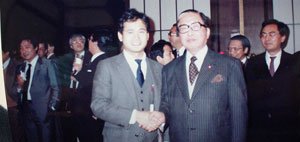
�����W���p���^�C���Y�V���Ј����C
�g�b�v�@���t�̕��@�R�X�^���J�@���r�C�X�g�@�S���o�`���t�@�T�~�b�g�@���[�K���@�����S���@�V�l���C�@���`�Ԋ��@Globalization
1991.4�@�W���p���^�C���Y�V���Ј����C�ŁA�����������Ď��@���w�B�����Ŏ�����߂��Ă���̂����B
���@�ȊO�ɂ������֊����X�A����A����A�����،�������ȂǂɘA��čs���܂����B
�@
�@
�@
�@
�@
����O�̃W���p���^�C���Y�j
���a�����ɐ푈�ɋ��͂��A������R�����W���p���^�C���Y�̗��j�ł��B
Through war's darkest days
Ex-bureaucrat led paper as it fell under state control
���S���́u�W���p���^�C���Y�̗��j�v�y�[�W
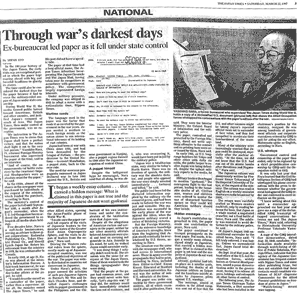 In the 100-year history of The Japan Times, the early 1940s was an exceptional
period in which the paper kept roaring ahead with big and forceful headlines to
glorify its stories.
In the 100-year history of The Japan Times, the early 1940s was an exceptional
period in which the paper kept roaring ahead with big and forceful headlines to
glorify its stories.
The time could also be considered the darkest days for
the paper because it had to serve the military-ruled empire of Japan under state
censorship.
During World War II, the media fanned public hatred toward
Americans, British and other enemies, and justified Japan's conquest of much of
Asia. The Japan Times, then under control of the government, was no exception.
"My instruction to The Japan Times was to stress that Japan shall have a perfect
victory, and that the nation shall fight it out to the very last person,"
Yasuhiko Nara, 79, a former Foreign Ministry bureaucrat who supervised the paper
at the time, said in an interview.
"And of course, the announcements (of
battle victories) by the (wartime) Imperial Headquarters were an absolute must
for the paper," he said.
In the 1930s, almost all the shares in the
newspaper were purchased by individuals at the request of the ministry, which
funded the purchase, according to Nara.
The ministry's control of the paper
lasted until September 1945, a month after Japan's surrender, when the U.S.-led
Occupation forces ordered the government to relinquish all media share
holdings.
Five decades later, Nara is a well-to-do businessman, serving as
adviser to three giant corporations: ... .
�������`�Ԋ��ʼn����ς������
�g�b�v�@���t�̕��@�R�X�^���J�@���r�C�X�g�@�S���o�`���t�@�T�~�b�g�@���[�K���@�����S���@�V�l���C�@���`�Ԋ��@Globalization
�A�w���푈�ȗ��A�p���̐A���n���������`��97/7/1�����A�������Ԋ҂���܂����B
�ԊҎ��T�̑O��̓��f�B�A���呛�����܂����B�p�j�b�N�ō��`�l�͊C�O�ɒE�o����̂ł͂Ƃ�����Y�����̂��ƂŐ����I���R�̂Ȃ��Â����͋C�ɂȂ��Ă��܂��̂ł͂ƁB�Ƃ��낪3�T�Ԃ������`�ɍs���Ă݂��礈ȑO�ƕς��Ȃ����`�Ɏv���܂����B�����̕��m���k�����{�̂���l�̎p���ǂ��ɂ���������Ȃ��̂ł������������ͤ���`���{�������o���Ȃ����߂Ɏ����ɏ������ꂽ���i�Ȃ̂ł����B
1840~�A�w���푈�@��1842���`���́u�i�v�����v
1856��Q���A�w���푈�@��1860�㗳�����́u�i�v�����v
1898�V�E��99�N�ԑd��
1941�`5�@���{�����(3�N8����)
�u�p���L���̓ǂݕ���ɂ��킵�����߂�����܂��B���̋L�����Ƃ��āA�����L���̍\���@��������܂����B
AS THE MEDIA HOOPLA SUBSIDES, RESIDENTS HARBOR MIXED FEELINGS
SAR Hong Kong�fs business remains business
The Japan Times, July 22, 1997
�@ HONG KONG �� Three weeks after the handover of this former British colony to China, the city-state has a palpable business-as-usual ambience about it.
�A There is neither a sense of jubilation, nor fear of an imminent wave of repression by its new ruler, the People's Republic of China.
�B The prevailing sense of normalcy has been brought about by years of design; London and Beijing have spent over a decade thrashing out the details of this unprecedented geopolitical power shift.
�C In addition, both Hong Kong and Beijing are apparently exercising restraint to avoid political acrimony; new Chief Executive Tung Chee-hwa has told Hong Kong's people to "leave behind the baggage of Tiananmen," referring to the 1989 Beijing massacre that led to a sudden chill in trilateral relations among Beijing, London and Hong Kong.
�D "There has been no change in Hong Kong since the handover day, . . . but maybe there will he some change 10 years from now," said 27-year-old hotel worker Thomas Ng in a comment characteristic of remarks made to The Japan Times by local residents.
�E "The People's Liberation Army soldiers are now here, but none of us have seen any one of them since July 1, because they are not allowed to walk around in town in uniform," he said.
�F The former colony, now called the Hong Kong Special Administrative Region, is China's richest, and, in a sense, newest city.
�G It is also its most democratic due to reforms installed in recent years.
�H On the surface, few things appear to have changed.
�I Beijing did not abolish the Hong Kong dollar, which is still the only legal currency, and the border with mainland China will remain closed to prevent unauthorized immigrants from pouring in.
�J Beijing has, thus far, shown no desire to suppress the laisse-faire economic system and its free-port policy, elements that have helped the tiny region half the size of Tokyo to grow into an economy one fourth the size of mainland Chinese economy.
�K The apparent absence of Chinese control here is stipulated in China's 1990 HKSAR Basic Law, enacted after years of negotiations with Britain.
�L China has given Hong Kong a "high degree of autonomy" and introduced a "one country, two systems" formula, a major factor in the smooth transfer.
�M Residents apparently harbor mixed feelings.
�N Many said they cannot yet conclude if they are happy to return to motherland China or unhappy due to the underlying fear of abuses by the Chinese Communist Party.
�O "We were alert at first," said Nicky Chan, a sales manager at a five-star hotel in Kowloon.
�P "But after one or two days, everything was as usual. Nothing had changed. We go to karaoke, go watch movies, and we go to work at our offices," he said.
�Q Despite these residents' claims, there have been some key changes, including the disappearance of British emblems from everything from government offices to public trash bins in favor of the new HKSAR emblems, as well as perceived civil rights reversals enacted by the new legislature.
�R This legislature, the Provisional Legislative Council, has been contentious as it replaced the Legislative Council, or LEGCO.
�S However Chan asserted that "Hong Kong is a (former) colony; we are used to listening to what the government says. Most of us are not interested in politics and this will remain so as long as the Basic Law and its 50-year guarantee (of keeping Hong Kong's socioeconomic system intact) are observed."
21 Nevertheless, many have shown what they have thought of this guarantee �� by emigrating to Canada, the U.S. and other nations with large overseas Chinese populations.
22 This pattern of emigration increased sharply after the 1989 Tiananmen crackdown on democracy activists, but peaked in 1992 when 66,000 left, according to a Hong Kong government source.
23 Some residents, however, feel a sense of patriotic joy.
24 "As a Chinese, I'm very happy. We now know what a nationality is, and have a sense of belonging," said 36-year-old Joanna Kan.
25 "It's impossible to predict how Beijing would act toward us in the future, but China has changed so much in the last 10 years that misgivings about its future action could prove unwarranted," Kan said.
26 Hong Kong residents enjoy imperfect but reasonable democratic rights, and the current rights are acceptable to many, she said.
27 "We have received colonial education from the British. The majority of people say they are not interested in politics. We were trained like that," she said.
28 Everyone in Hong Kong felt sorry for what happened in Tiananmen, but "what happened happened. We look forward to the future," she stated with an optimistic smile.
29 Others continue to disapprove of China.
30 "Are you asking me if I'm happy? No kidding. I hate the Communists," said a barber who asked that she not be named.
31 Deanna Lee, 26, who attended schools for British nationals, said more voting rights should be given to the residents.
32 A British national because her mother is British, Lee said Hong Kong should have been granted independent country status just like other former British colonies.
33 "Of course, we prefer not to be (under Beijing rule). We prefer to be an independent country . . . like Australia and India," she said.
34 For its part, the new administration has done well to make its presence in Hong Kong appear as innocuous as possible in order to avoid provoking hostile sentiments during these ear]y days.
35 The 1984 Joint Declaration that led to the handover allows China to station military units in Hong Kong.
36 Hong Kong clearly faces no external threats but Deng Xiaoping, who inked the agreement with Margaret Thatcher 13 years ago, wanted a deterrent against mass rallies and civil unrest.
37 This is the interpretation of many China watchers.
38 Since June 30, some 5,000 PLA soldiers have crossed the border in trucks and armored cars, but most of them are being kept out of the city; they are mostly stationed at rural locations in the New Territories.
39 The PLA headquarters, however, are located in the heart of the city in a tall building overlooking Victoria Harbor.
40 Elements of the British military command previously occupied this building, the Prince of Wales tower, until their departure June 30.
41 PLA soldiers are under orders not to walk around in uniform, and no guards are seen at the gates of its HQ, leaving the impression that the building is deserted.
42 The PLA's low-profile strategy is expected to continue until Aug. 18, the Sino-Japanese War Victory Day that marks the defeat of the Japanese who ousted the British and ruled Hong Kong during late 1941 and 1945.
43 The British military used to hold a yearly march through the city on this anniversary, and the PLA is expected to hold its own public ceremony.
44 Beijing's Foreign Ministry has opened a 20-story office somewhere in central Hong Kong.
45 But little information has been released concerning this branch, and none of the residents interviewed knew its exact location or how many Beijing-appointed cadres and staffers currently work there.
46 A phone call to this enigmatic organization made by The Japan Times was answered by an English-speaking man who gave another number to call.
47 It turned out to be the number of Hong Kong's tourist office.
�����ԓ��{���p��
(�����ł͓��p��������܂���ǂ�����������������̂ŁA�p���̓W���p���^�C���Y�Ɍf�ڂ������̂ł���܂����{���ǂ�ł���p����ǂ߂Γǂ݂₷�����Ǝv���܂��)�@

�@�V������Ƃ��a������Ƃ��A�f�G�Ȗ��O�����炦����q�l�̎��悭�A�傫���������邩������܂���B�t�ɁA��Ȗ��O�����Ă��܂��Ƃ��̉�Ђ͑O�r����ł��B�ߔN�͉p�ꕗ�̊�Ɩ�������̂��͂���Ă��܂����A���{�l�ɂƂ��Ă͂������������O�ł��A�O���ł͌������Ă��܂����O�����Ȃ肠��܂��B
�@�Ƃ��ɍ��ۓI�ȋƖ��ł���q��ƊE�ł́A�O���l�ɂƂ��Ă��D���x�̍�����Ɩ���I�Ԃ��Ƃ��K�v�ł��傤�B�Ƃ��낪�A�ŋ߂̍q���Ђ̊�Ɩ��ɂ̓g���f���i�C���̂�����܂��B
�@96�N�̓~����97�N�ɂ����āA���{�ɂ͐V�����q����(���m�ɂ͍q���ЂƂ��Ă̔F�����߂���)���Z���a�����܂����B�ߔN�i�߂��Ă���q��Y�Ƃ̋K���ɘa�ƁA�H�c��`�̉����ړ]�E�g������������ɐݗ����ꂽ���̂ł��B
�@��Ԑ�ɎY�����グ���̂́A�����̗��s�㗝�X��H.I.S.�Ȃǂ��������q���Ђł��B96�N�̂P�P���P�Q���ɂ��̐V��Ђ͓o�L����A�u�q��ƊE�ł̂Ђ��т��̐V�K�Q���v�Ƃ��đ傫�ȃj���[�X�ɂȂ�܂����B�W���p���^�C���Y�ł��傫���Ƃ肠���܂������A���̓��͂܂���Ђ̖��O�����܂�܂���ł����B���̌�U���Ԃɂ킽��A������������̊�Ƃ̏d�����������c�𑱂��A�V��Ђ̔�������Ė����������̂��L�҉�Ŕ��\����܂����B�X�J�C�}�[�N�q��ł��B
�@�X�J�C�͋�ł����A���̉�Ђɂ��Ɓu�A�����v�Ƃ����C���[�W���������������߂Ɏg���������ł��B�܂��A�}�[�N�́u�o���_�v�Ƃ��Ďg���A�X�J�C�}�[�N�q��ɂ́u�����ȃX�^�[�g�n�_����q��ƊE�ɎQ������v�Ƃ����Ӗ������߂��Ƃ̂��Ƃł��B���{��Ƃ��Ă݂邩����A�Ȃ��Ȃ��X�}�[�g�Ȗ��O�ł��B
�����ԂȂ���ƃC���[�W
�@�Ƃ��낪�A���̋L�҉�ɂ��Ă̋L�����o�e�����Ƃ���A�ǂݎn�߂��A�����J�l�̍Z���L�҂��Q���Q���������܂����B���R���ƁASkymark Airlines Co.�Ƃ��������������Ƃ���A���̒��ɃA�����J�̐푈�f��̏�i�������Ƃ̂��ƁB���̏�i�Ƃ́A�o�������퓬�@�̃p�C���b�g�����[�_�[�œG�@��ߑ��A"Mark at 10 o'clock!"�Ƌ��Ԃ��̂ł��B�푈�f��ɂłĂ���X�����O�Ƃ��Ă�mark�̓��[�_�[��œ_�ł���G�@�̕W�I�}�[�N���Ӗ����A10 o'clock�Ƃ̓��[�_�[�����v�ɂ݂��Ă�ƂP�O���̕����ɂ���Ƃ������Ƃł��B
�@mark�ɂ͂��낢��ȈӖ�������܂����A���̉�Ж��ł́usky�ɂ���mark�v�Ƃ������ƂŁAmark�̈Ӗ��̈�ł���target�i�W�I�j�Ƃ����Ӗ���A�z���₷���Ȃ�܂��B�܂�A�X�J�C�}�[�N�q��Ƃ́u���Ԍ��ĖڕW�v�Ɖ��߂��邱�Ƃ��\�ł��B���̉�Ђ������č��ɏA�q�����Ƃ��A�č��̏�q��Skymark Airlines�i����u���W�I�q��v�j�Ƃ�����Ж������ĉ���������̂ł��傤���B
�@�P�Ȃ�u���b�N���[���A�ł��ނ�������܂��A�ė����̂��������ۂɂ́A�p�ꌗ�̃��f�B�A�͂��̖��O�ƒė��Ƃ̈��ʊW�ɂ��Ă����Ƌc�_����̂ł́B���Ȃ݂ɁA�W�R�N�X���ɂ͑�؍q��@�����\�A�̐퓬�@�ɓG�@�W�I�ƌ�F����~�T�C���Ō��Ă��ꂽ����������܂����B
![]()
����Ȃ���s�@
�@���āA�X�J�C�}�[�N�q��ɑ����Ė������グ���̂��A�D�y�̍��E���ݗ������k�C�����ۍq��ł��B�����A�p�ꖼ�͂Ȃ��A�W���p���^�C���Y�Ŗ₢���킹���Ƃ���A�u�K���ɖĂ����Ă��������v�Ƃ������ƂȂ̂ŁAHokkaido International Airlines�Ƃ��ĕ��܂����B
�@�Ƃ��낪�A97�N�t����AHokkaido Operating System�Ƃ����p�ꖼ���g���n�߂܂����B����HOPS�ł��B�k�C�����Y�̃r�[�������̃z�b�v���Ђ��������̂ł��傤�BHOPS�ɂ��Ẳp���L�����I�[�X�g�����A�l�̍Z���L�҂ɏo�e�����Ƃ���A�u���̉�Ђ̔�s�@�͂��������ړI�n�܂ł��ǂ蒅����̂��H�v�Ƌ���Ă��܂����B
�@���̖����ɂ������Ắu�z�b�v�E�X�e�b�v�E�W�����v�v�Ƃ������t���A�z���Ă���₩�Ȑ����C���[�W��^�����������̂��Ǝv���܂����A���㋣�Z��ڂ̎O�i���т́u�z�b�v�v�̕����͉����l���Ă݂Ă��������Bhop(s)�Ƃ́u�Б��Œ��Ԃ��Ɓv��u�i���������j�s�����s�������ԁv�i��ɒ���ł����n�ʂɗ�����j���Ƃł���A�u��ԁv���Ƃł͂Ȃ��̂ł��B�p�ꌗ�̏�q�ɂƂ��ẮAHOPS�q��́u�s�����s�����q��v�Ƃ��������ŁA���悷��Ƒ�P�K���������ł��B
�@���̌�A���̉�Ђ�HOPS�Ƃ������O����߂܂����B�D�y�ɂ�����{�q��̊֘A��Ђɓ����̂��̂����邱�Ƃ��킩��A���̖��͎̂g�p�s�\�ł��邱�ƂɋC�������̂ł��B�����ʼnp�ꖼ��Hokkaido International Airlines�Ƃ��A���x�͈��̂�S�������ʌ��債�܂����B
�@�����ĂW���ɔ��\���ꂽ�̂�AIR
DO�ł��B�L�҉�ł̐����ɂ��ƁADO�́u�s���v�Ɓu�i�k�C���́j���v�̓�̈Ӗ��ŁA�u�k�C���̊������̂��߂ɍs������q���Ђ�\�����Ă���v�����ł��B���̃j���[�X����A���͍Z���L�҂����̑O�ɍs���Č����܂����B
�u�k�C�����ۍq��̈��̂����܂����̂Ŕ��\���܂��BAIR DO�ł��v�@�ꓯ���ł����B
�@���̖��O���ĒN�����A�z�����̂�hairdo �i���`�j�ł��B�p�ꌗ�̏�q�ɂƂ��Ă�AIR DO�q��́u���e���q��v�ƕ�������ł��傤�B
�@���āA�����ł̓n�[���N�C���q��(Harlequin Air)��97�N1���ɐݗ�����܂����B���̉�Ђɂ��ƁA�n�[���N�C���̓C�^���A�̌ÓT�쌀�̓o��l������Ƃ������̂ŁA�����ɐl�C�̓����̃��}���X�����W�Ƃ͊W�Ȃ������ł��B�C�ɂȂ�̂́A�č��̂��̎�̏����̓T�^�I�e�[�}�̈���A�v���C�{�[�C�̃p�C���b�g�Ƃ́u���y���v�I�W�ł��邱�Ƃł��B
�@�V���ɂȂ��āA���̉�Ђ́u�X�`�����[�f�X���X�V���̗p���܂����v�Ɣ��\���܂������A��͂�A�����J�l�L�҂炪���Ă��܂����B
�@�Ȃ��A������Ƃ������O�̉�Ђ��ݗ�����Ă��܂��B�����������ɂł�����Ђ�Pan Asia Airways�Ƃ����܂����A�В�����͂ނ����č��̑�q���Ђ�����Pan Am�ŏ斱�������Ă��������ł��B���̕��͉p��b�w�Z�̌o�c�҂ł�����A���̂��߂Ɋ�ȉp�ꖼ������邱�Ƃ��ł����̂ł͂Ǝv���܂��B
�����ȉ��̓W���p���^�C���Y�f��(97�N8��9��)�̂قړ����e�̉p���L���ł��B���Ǘp�ɖT����lj����܂����
NEW AIRLINE FAD
Airline deregulation spurs crazy names
�y���o����:
NEW AIRLINE FAD (���s)�@�\�@Airline
deregulation (�K���ɘa) spurs (����������) crazy (���ς���) names
Great corporate (��Ƃ�) names, carefully selected to boost (���i������) a firm's
public image, can bring great fortune. A misleading (����������悤��) name, on the
other hand (����ł�), could spell (�`�ɂȂ�) disaster, especially for airlines.
Japan has seen a rush of new airlines trying to cash in (�ׂ���) on the
deregulation of the industry and the expansion of Tokyo's Haneda airport. But
the names of these fledgling (���܂ꂽ�����) carriers (�q����), though generally
pleasing (�C����������) to Japanese ears, have mostly confused English speakers
because they give the impression that their planes could either be shot down,
jump like a rabbit or do something other than fly, like�@dress your hair (���𐮂���).
So far, six carriers have been created since 1996 with capital from
investors in Tokyo, Hokkaido, Fukuoka and Okinawa. These firms expect to obtain
formal authorization (�F��) and begin operations (�Ɩ�), at discounted (������) rates,
sometime between 1998 and 1999.
The front-runner was established Nov. 12, 1996 with investments
(��������) from Tokyo-based (�������{�Ђ�) travel agency (���s�㗝�X) H.I.S. Co. and others.
The new firm's carefully selected name, the investors announced, is Skymark
Airlines Co.
The name immediately raised apprehension (�S�z) among some English-speaking
people in Tokyo because mark means target (�W�I). Some recalled (�A�z����) American
war movies in which some fighter (�퓬�@) pilots refer to certain flashes (����_) on
radar screens as "marks." In wartime slang, bogey was another popular word, but
the term mark (mark�Ƃ������t) also referred to enemy aircraft�@�@(�G�@)
that had to be shot down.
The company explained later that sky symbolizes blue, which is said to
signify fairness, and that the name Skymark thus means "fair starting point."
After Skymark's announcement, other investors (������) soon followed,
setting up (�ݗ���) their own new airlines with their own collection of unlikely
names (���낢��Ȋ�Ȗ��O).
�@ Investors in Hokkaido emulated (�܂˂�) Skymark later that
month with Hokkaido International Airlines. For a brief period, the firm used
its unofficial English name: Hokkaido Operating Systems, or HOPS, for short
(������). The investors apparently (�`�炵��) thought it was a soothing (�C���̂悢),
lovable name, because Hokkaido produces great beer hops (�r�[�������̃z�b�v). No doubt
(�`�ł������ɂ������Ȃ�) they did not realize (�C����) that English-speaking people could
take it to mean that their planes would hop -- move in small jumps
(�n�ʂ��s�����s��������������) -- rather than take to the air (�����).
The name was later dropped when it was found that another company in the
industry was named HOPS. On Thursday, the firm's president, Akira Nakamura,
announced the airline's new nickname: AlR DO.
"Do represents (�\��������) two things, 'action' and 'do' as in Hokkaido,"
Nakamura told a news conference. So AlR DO embodies (�\��) an airline that acts
toward revitalizing (�Ċ���������) Hokkaido," he said.
For English speakers, the unorthodox (�]���̍l���ɂƂ���Ȃ�) English-Japanese
hybrid (������) is too easily confused with hairdo (���̃Z�b�g), and does not sound like
an airline. A reversal of the two words - DO AIR - may have been slightly more
plausible (�܂�), but not as stylish.
Maybe the investors have fallen prey (�e������) to too many Nike commercials
(�i�C�L�Ђ̓}�C�P���E�W���[�_�������N�p����AIR���g����CM�Œm����).
Other newcomers (�V�Q��) to the business (���̋ƊE) include the Fukuoka-based
Harlequin Air, set up by Japan Air System in January. The company said the use
of Harlequin was inspired (�v������) from a character (�o��l��) in a classical Italian
comedy and is intended to (�`���Ӑ}���Ă���) make passengers cheerful.
It said any association (�A�z) with the best-selling (�x�X�g�Z���[��) romance
novels by the same name is just a coincidence (���R�̈�v). Still, the fledgling
airline made a special point (���܂����Ƃ�����) in announcing last month that it had
hired 97 female flight attendants (�X�`�����[�f�X).
Fukuoka has another new firm. Pan Asia Airways. The name is conspicuously
(�͂�����)�@similar to another famous airline, possibly because its president
was once a Pan Am steward (�j���斱��). Investors in Okinawa, meanwhile, have set up
Southern Cross Co., while Japan Airlines has set up a subsidiary (�q���) called
JAL Express.
�@�����O���[�o���C�[�[�V�����̌��Ɖe�@
�g�b�v�@���t�̕��@�R�X�^���J�@���r�C�X�g�@�S���o�`���t�@�T�~�b�g�@���[�K���@�����S���@�V�l���C�@���`�Ԋ��@Globalization
�A�C�������h�ł�2001�N���EEU�W���[�i���X�g��c�B
 �L���i�ƂĂ������j�͂��̃T�C�g�ɂ���܂��B�T���̋L���iThe
Japan Times�ցj
�L���i�ƂĂ������j�͂��̃T�C�g�ɂ���܂��B�T���̋L���iThe
Japan Times�ցj
�@
�@
�_�u�����̌Â��z�e������Irish Sea��]��
�@
�@
�@
�g�b�v�@���t�̕��@�R�X�^���J�@���r�C�X�g�@�S���o�`���t�@�T�~�b�g�@���[�K���@�����S���@�V�l���C�@���`�Ԋ��@Globalization �@
���Ō�ɕҏW���������@JT06/9/16
���͗���A�L�҂���ҏW�҂ցA�����ĊǗ��E�ւȂ�܂����B
�L�҂̂Ƃ��̍�i�́A�L���ł����B�ҏW�҂Ƃ��Ă̍�i�͎��ʁB�����ĊǗ��E�Ƃ��Ă̍�i�͐l�⎖��(�V���Ȃ�)���̂��̂ł��傤�B
�ł��Ƃ��ǂ��A�ߋ��Ƀ^�C���X���b�v���邱�Ƃ�����܂����B���̓��́A��ނɊO�o�����O�M�����̃s���`�q�b�^�[�Ƃ��āA�O�M�X���b�g�߂܂����B���ۃj���[�X�ʂT�y�[�W������܂����B
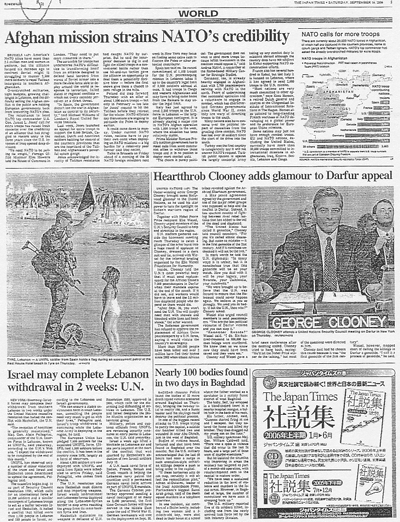
���������L���ɂ͐}����t���ĕ�����₷���B�ڂ����R�ƍs���ʒu(CVI)�ɃR���g���X�g�̂���ʐ^�B�o�D�Ŗڂ������B

���ۖʂɂ��炩���L���Ǝʐ^��

�ʐ^�Ǝʐ^��}�����Ԃ���Ȃ��悤�Ƀf�U�C���B
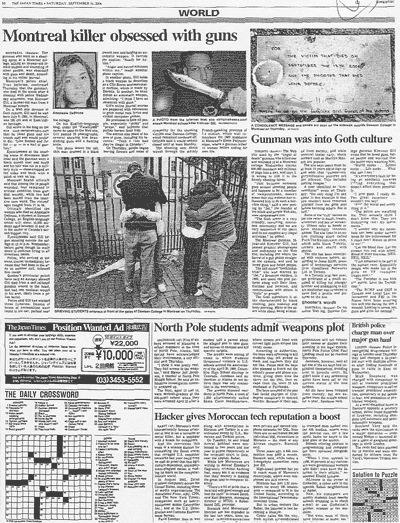
���G�ȎЉ�ʎ����ł́A��Q�ҁE�e�^�҂̎ʐ^���V���{���b�N�Ȉʒu��
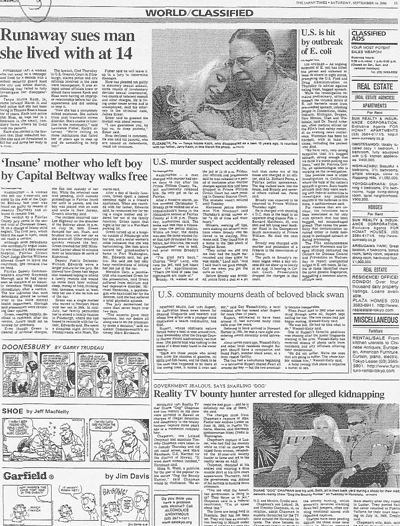
�܂����鍑�ێЉ�ʁB�ł��邾��human interest���̂�
���W���p���^�C���Y�̗��j�@-- �]�ˎ��ォ��@
�n��110���N�L�O�ʍ�����W���ɏ��������̂ł��B
���@�W���p���^�C���Y�̗��j�y�[�W
���j���[�X�p��@�֘A�y�[�W
���p���V���̓ǂݕ�����
�����o���̓ǂݕ��@
���{�@�p���L���̓ǂݕ�
���{�@�j���[�X�p�ꋳ�{
���T��ST ���e�E�w���y�[�W
���W���p���^�C���YWEEKLY �@
���W���p���^�C���Y�̓��e
��NHK�u�j���[�X�ʼnp��b�v�@
���g���̂Q�{(�L�ғ��P)�@